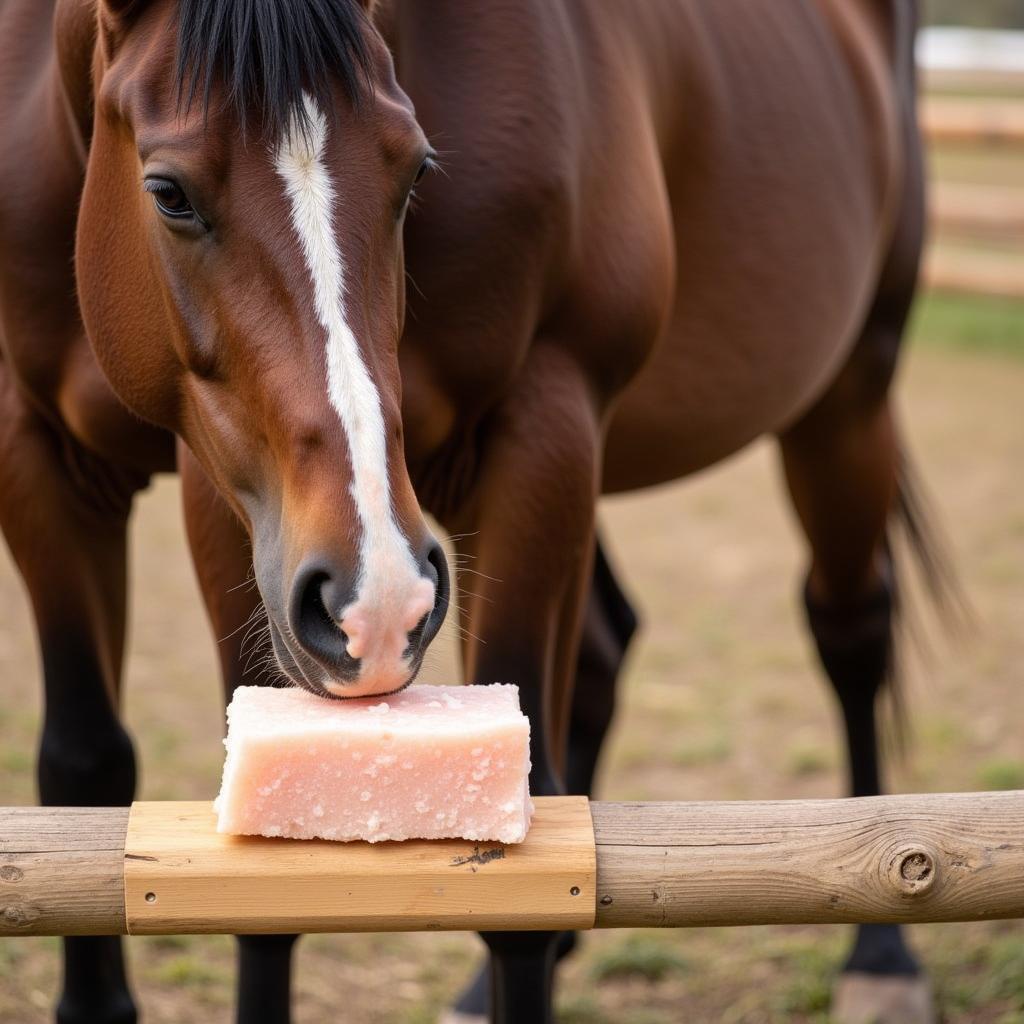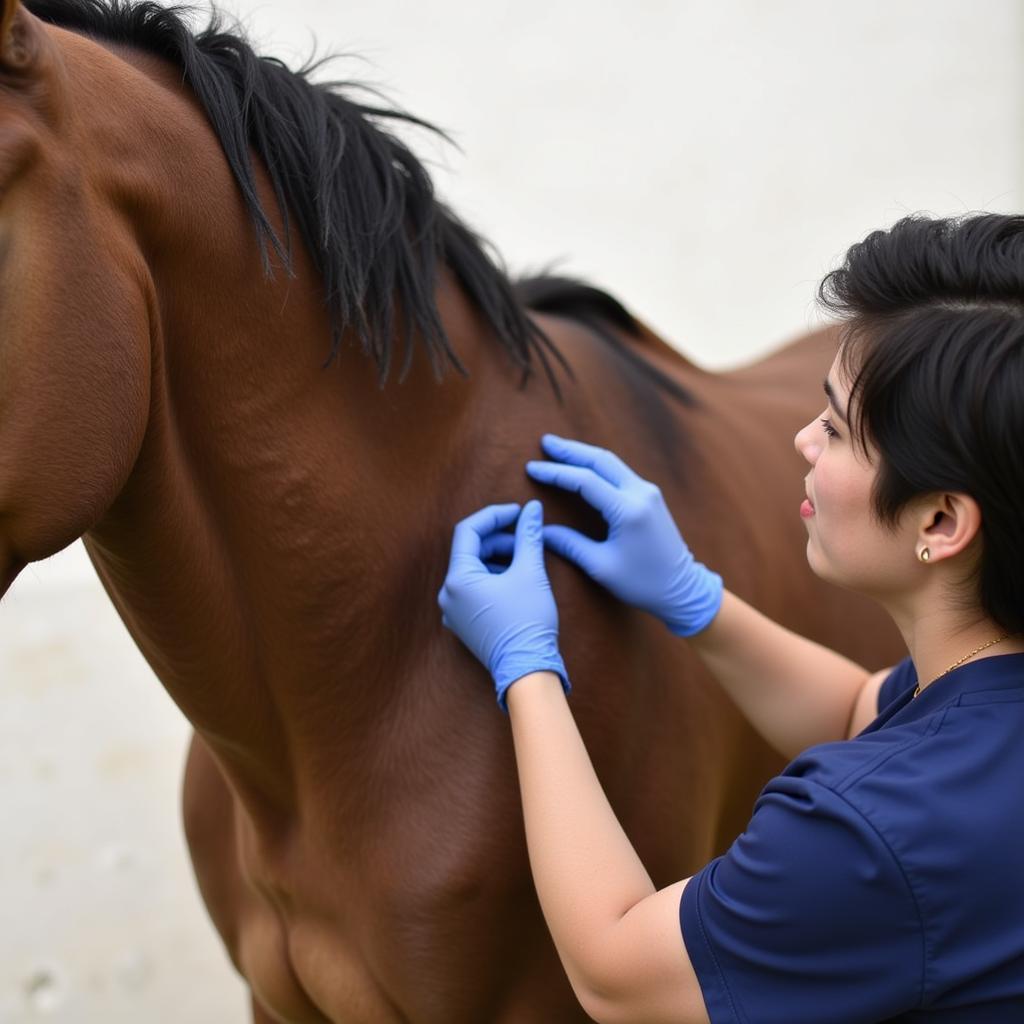Iodized Salt For Horses is a crucial aspect of their overall health and well-being. Providing the correct amount of iodine through iodized salt helps ensure proper thyroid function, which influences numerous bodily processes. Let’s explore the importance of iodized salt for your equine companion.
 Horse Eating an Iodized Salt Block
Horse Eating an Iodized Salt Block
Why is Iodine Important for Horses?
Iodine is an essential mineral for horses, playing a vital role in the production of thyroid hormones, thyroxine (T4) and triiodothyronine (T3). These hormones regulate metabolism, growth, and development. Without sufficient iodine, horses can develop hypothyroidism, a condition that can lead to a variety of health problems.
Signs of Iodine Deficiency in Horses
Recognizing the signs of iodine deficiency is crucial for early intervention. These signs can include lethargy, weight gain, poor coat condition, reproductive issues, and impaired immune function. If you suspect your horse is iodine deficient, consult a veterinarian for diagnosis and treatment.
 Veterinarian Checking a Horse's Thyroid
Veterinarian Checking a Horse's Thyroid
How Much Iodized Salt Do Horses Need?
Providing the correct amount of iodized salt is crucial. Over-supplementation can be just as harmful as deficiency. A general guideline is to provide 1-2 ounces of iodized salt per day for an average-sized horse. This can be offered in a free-choice block or mixed into their feed. However, individual needs may vary depending on the horse’s diet, activity level, and overall health. Consulting horse iodine resources can provide more insight into individual needs.
Different Ways to Provide Iodized Salt
There are various ways to ensure your horse receives adequate iodine. Iodized salt blocks are a convenient option, allowing horses to regulate their intake based on their needs. Alternatively, loose iodized salt can be added to the horse’s feed. Mineral mixes formulated specifically for horses often include iodine as well.
Understanding Iodine Content in Feed
Not all horse feeds contain the same amount of iodine. It’s important to carefully review the feed labels and consult with a nutritionist or veterinarian to determine if supplemental iodine is necessary. Factors such as forage type and other supplements can influence the overall iodine intake. horse iodine can provide additional information on iodine in feed.
Common Concerns about Iodized Salt for Horses
Some horse owners express concerns about providing iodized salt, fearing potential negative effects. However, when provided in appropriate amounts, iodized salt is safe and beneficial for horses. It’s important to dispel any myths or misconceptions surrounding iodized salt and emphasize its importance for equine health. Knowing how much iodine is enough can be tricky, so always consult with a professional.
Expert Insights on Iodized Salt
Dr. Emily Carter, Equine Nutritionist, emphasizes, “Iodine deficiency can have a significant impact on a horse’s overall health. Ensuring adequate iodine intake through iodized salt is a simple yet crucial step in maintaining their well-being.”
Dr. John Miller, Equine Veterinarian, adds, “I often see horses with subtle signs of iodine deficiency, such as a dull coat or decreased energy levels. Adding iodized salt to their diet can make a noticeable difference.”
Conclusion
Iodized salt for horses is essential for their health and well-being. Providing adequate iodine supports proper thyroid function, contributing to optimal metabolism, growth, and development. By understanding the importance of iodized salt and providing it correctly, you can help your equine companion thrive.
For more specific guidance on your horse’s iodine needs, consult with your veterinarian or an equine nutritionist. They can help you determine the appropriate amount of iodized salt to provide and ensure your horse receives the necessary nutrients for optimal health.
FAQ
- What are the signs of iodine deficiency in horses?
- How much iodized salt should I give my horse?
- Can I give my horse too much iodized salt?
- What are the different ways to provide iodized salt to horses?
- Do all horse feeds contain iodine?
- What if my horse doesn’t like iodized salt blocks?
- Where can I buy iodized salt for horses?
When you need support, please contact Phone Number: 0772127271, Email: [email protected] or visit us at QGM2+WX2, Vị Trung, Vị Thuỷ, Hậu Giang, Vietnam. We have a 24/7 customer service team.